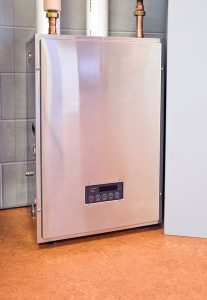 Tank Water Heaters: They’re big, noticeable, often noisy, and seen in the majority of homes throughout the country.
Tank Water Heaters: They’re big, noticeable, often noisy, and seen in the majority of homes throughout the country.
With such a large presence, most people understand that these Salt Lake City water heaters need maintenance from time to time, particularly because these are often subject to scaling, which is the mineral buildup that you may hear evidence of (you’ll hear a clanging noise). Scaling causes issues with pressure, temperature, and even corrosion, leading tank water heaters to often need flushing to offset the problem.
What Does This Have to Do with Tankless Water Heaters?
What most homeowners don’t realize is that if they have a tankless water heater, it too needs maintenance. And much of that maintenance is very similar to that of a storage tank system. We’d be happy to jump on a call with you to explain this further, but in the meantime, here’s some more information on scaling and how it impacts any water heater.
The Problem with Scaling
Scaling is the result of mineral buildup, as we mentioned above. This mineral buildup (of calcium and magnesium) is referred to as hard water. When the calcium and magnesium gets left behind in plumbing appliances or pipes, we call it scaling.
While scaling does tend to be a more prominent issue in storage tank water heaters, it can impact the heat exchanger portion of your tankless water heater. As you might realize, the heat exchanger is the component responsible for heating up the water in the first place. You need it to be clean so that water can be heated effectively and efficiently. Scaling can cause your burners to work harder than they should have to, and/or can overwork your water heater to the point that it breaks down.
“How Often Should I Schedule Maintenance?”
The short answer to this is, “it depends.” Some tankless water heaters—those in areas only mildly impacted by hard water—may only need to be done every 2-3 years. But for others, it’s vital that maintenance be done once a year. Mineral deposits are far more common in some countries than others, and even in some regions more than others.
The best thing you can do is contact a professional plumber to test your water for hardness. There are also signs you can watch for on your own that indicate your home is, in fact, suffering from hard water. For instance, you might often notice a chalky white or yellow buildup around the faucets or drains, or you may notice spots on your glasses and dishware after being washed.
When a Tankless System Should be Replaced
Annual (or semi-annual) maintenance is certainly important for a tank or tankless water heater. But, it won’t make the system last forever. Eventually, you will need to replace your tankless water heater with a new one. A tankless system, though, will often last over 20 years.
If your tankless water heater starts failing long before this time, it can be due to any lack of maintenance. Staying on top of your tune-ups is the only way to ensure your system lives out its full lifespan.


